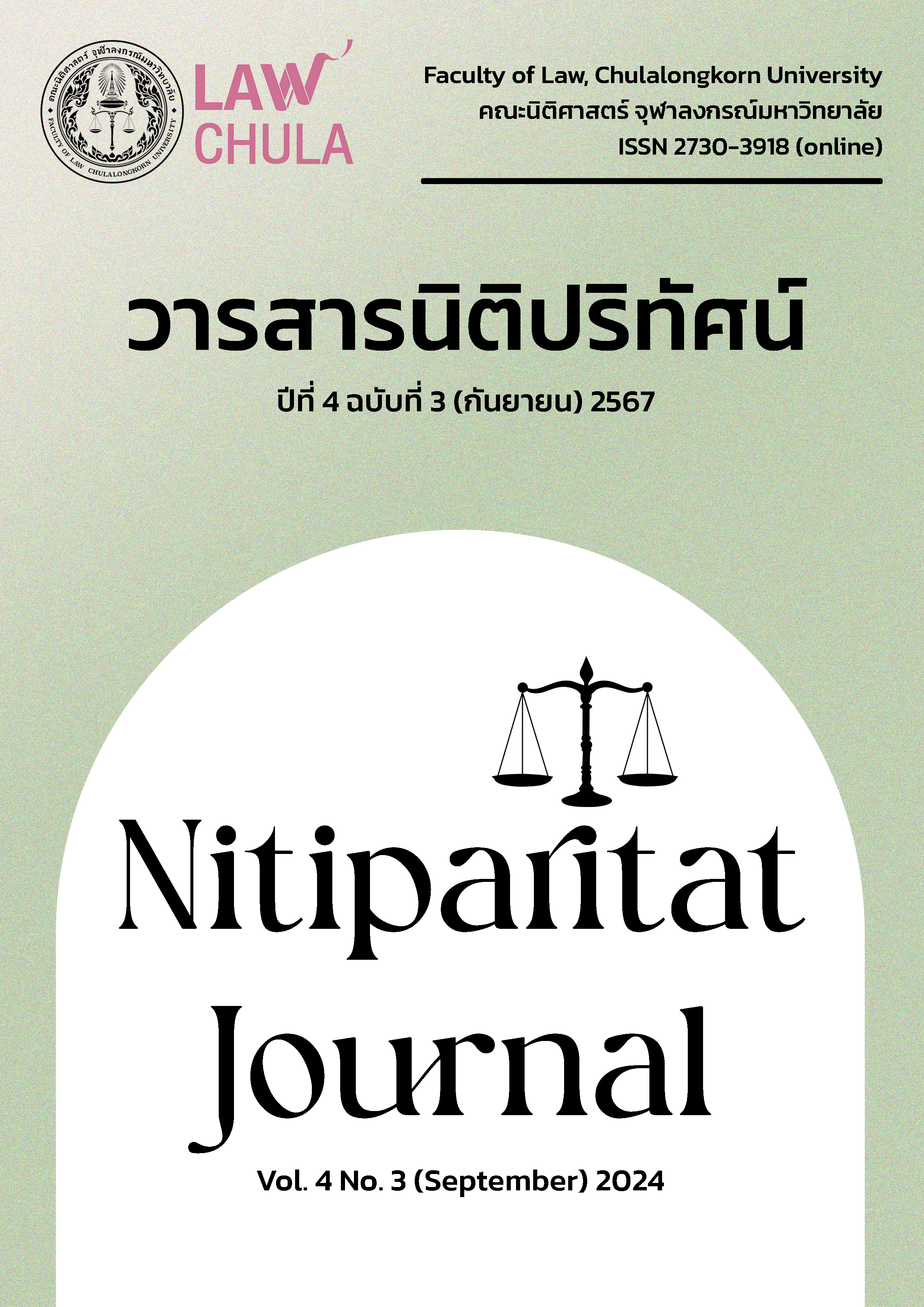ปกิณกะกฎหมาย : ว่าด้วยนิติสงครามและรัฐธรรมนูญ
คำสำคัญ:
นิติสงคราม, รัฐธรรมนูญ, การเมืองบทคัดย่อ
นิติสงคราม (Lawfare) คือคำที่สื่อความหมายถึงยุทธวิธีการใช้กฎหมายหรือระบบกฎหมายเพื่อสร้างความเสียหายหรือบ่อนทำลายขั้วตรงข้ามของผู้ใช้กฎหมายเป็นเครื่องมือแห่งนิติสงคราม คำอธิบายว่าด้วยนิติสงครามนี้อาจจะดูใหม่ในสังคมไทย แต่งานชิ้นนี้พยายามจะชี้ชวนให้เห็นว่าการศึกษาถึงกฎหมายในฐานะเครื่องมือแห่งนิติสงครามนั้นได้กระทำมาอย่างยาวนานแล้วในงานที่เขียนเป็นภาษาต่างประเทศโดยเฉพาะภาษาอังกฤษ ในฐานะของปกิณกะกฎหมาย งานชิ้นนี้พยายามจะชี้ชวนให้เห็นถึงความเป็นไปได้ว่าแนวคิดเรื่องนิติสงครามนั้นสามารถถูกนำมาใช้เพื่ออธิบายการใช้รัฐธรรมนูญในฐานะกฎหมายภายในประเทศเพื่อเป็นเครื่องมือในการทำลายหรือทำให้คู่แข่งทางการเมืองได้รับความเสียหายได้ ทั้งนี้ การอธิบายในลักษณะนี้ไม่ได้เป็นการอธิบายในลักษณะใหม่จนถึงขนาดว่าไม่เคยมีผู้อธิบายมาก่อน แต่ผู้เขียนเห็นว่าหากมีการศึกษาความเชื่อมโยงระหว่างนิติสงครามและรัฐธรรมนูญอย่างเป็นกิจจะลักษณะ ผลลัพธ์ที่ได้ย่อมมีความน่าสนใจและอาจจะก่อประโยชน์ให้ผู้ที่สนใจศึกษาความสัมพันธ์ระหว่างรัฐธรรมนูญกับสังคมและการเมืองอย่างลึกซึ้ง
เอกสารอ้างอิง
อนาคตใหม่ - Future Forward, ‘กระบวนการ “Lawfare” หรือ “นิติสงคราม” : ปิยบุตร แสงกนกกุล (คลิปสั้น)’ (18 พฤศจิกายน 2562) <https://www.youtube.com/watch?v=hqysSy3a8sw> สืบค้นเมื่อ 16 มิถุนายน 2567.
Jaume Castan Pinos and Mark Friis Hau, Lawfare: New Trajectories in Law (Routledge, Taylor & Francis Group 2023)
Kate Jean Dent, Lawfare and Judicial Legitimacy: The Judicialisation of Politics in the Case of South Africa (Routledge, Taylor & Francis Group 2024)
Jaime Humberto Gándara Pizarro and Fabián Humberto Gándara Pizarro, ‘Lawfare’ (2022) EUNOMÍA. Revista En Cultura De La Legalidad 267, 267-287.
Siri Gloppen, ‘Conceptualizing Abortion Lawfare’ (2021) 17 Revista direito GV 1, 1-19.
Larry M. Goldstein, A Table against Mine Enemies: Israel on the Lawfare Front (Gefen Publishing House 2017)
Cristiano Martins, Valeska Martins, and Rafael Valim, Lawfare: Waging War through Law (Routledge 2021)
Patrick S. Nash, Deniz Guzel, Total Lawfare: New Defense and Lessons from China’s Unrestricted Lawfare Program (1st edn, Routledge, Taylor & Francis Group 2024)
Ferenc Petruska, ‘Domestic Lawfare in South America’ (2024) 23 Academic and Applied Research in Military and Public Management Science 19, 19-34.
‘Lawfare: Strategies and Tactics’ (Rodrigo Del Olmo) <https://www.rodrigodelolmo.com/lawfare-estrategias-y-tacticas/> accessed 13 June 2024.
Orde F. Kittrie, Lawfare: Law as a Weapon of War (Oxford University Press 2016) 6.
Cristiano Martins, Valeska Martins, and Rafael Valim (n 2) 14-62.
Siri Gloppen, Thalia Gerzso, and Nicolas van de Walle, ‘Legal Strategies: Constitutional, Administrative, Judicial, and Discursive Lawfare’ in Leonardo R. Arriola, Lise Rakner, and Nicolas van de Walle (eds), Democratic Backsliding in Africa?: Autocratization, Resilience, and Contention (Oxford University Press 2022) 62-71.
Cristiano Martins, Valeska Martins, and Rafael Valim (n 2) 7.
Siri Gloppen, Thalia Gerzso, and Nicolas van de Walle (n 5) 63.
Ibid 68.
Tom Ginsburg, ‘Constitutions as Contract, Constitutions as Charters’ in Denis J. Galligan and Mila Versteeg (eds), Social and Political Foundations of Constitutions (Cambridge University Press 2013)
Ran Hirschl, ‘The Strategic Foundations of Constitutions’ in Denis J. Galligan and Mila Versteeg (eds), Social and Political Foundations of Constitutions (Cambridge University Press 2013)
John Higley and Michael Burton, Elite Foundations of Liberal Democracy (Rowman & Littlefield Publishers 2006)
Dan Slater and Joseph Wong, ‘The Strength to Concede: Ruling Parties and Democratization in Developmental Asia’ (2013) 11 Perspectives on Politics 717, 717-733.
Adam Przeworski, Democracy and the Market: Political and Economic Reforms in Eastern Europe and Latin America (Illustrated edn, Cambridge University Press 1991).
ดาวน์โหลด
เผยแพร่แล้ว
รูปแบบการอ้างอิง
ฉบับ
ประเภทบทความ
สัญญาอนุญาต
ลิขสิทธิ์ (c) 2024 ณัฐดนัย นาจันทร์

อนุญาตภายใต้เงื่อนไข Creative Commons Attribution-NonCommercial-NoDerivatives 4.0 International License.
บทความที่เสนอเพื่อพิจารณาการตีพิมพ์ต้องไม่มีลักษณะคัดลอกผลงานวิชาการและต้องไม่มีเนื้อหาที่ละเมิดลิขสิทธิ์



